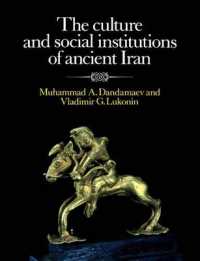Full Description
"This is a masterful primer on existential therapy that has been forged from the pen of a highly seasoned theorist, researcher, and practitioner. In Pragmatic Existential Counseling and Psychotherapy: Intimacy, Intuition and the Search for Meaning, we gain the insight and personal experience of one who has lived and breathed the field for over 50 years—alongside some of the greatest practitioners of the craft, most notably Viktor Frankl. This volume is superb for students interested in a broad and substantive overview of the field."
—Kirk Schneider, Columbia University
Pragmatic Existential Counseling and Psychotherapy integrates concepts of positive psychology and strengths based therapy into existential therapy. Turning existential therapy on its head, this exciting, all-new title approaches the theory from a positive, rather than the traditional deficit model. Authored by a leading figure in existential therapy, Jerrold Lee Shapiro, the aim is to make existential therapy positive and easily accessible to a wide audience through a pragmatic, stage wise model. Shapiro expands on the work of Viktor Frankl and focuses on delivery to individuals and groups, men and women, and evidence based therapy. The key to his work is to help the client focus on resistance and to use it as a means of achieving therapeutic breakthroughs. Filled with vignettes and rich case examples, the book is comprehensive, accessible, concrete, pragmatic and very human in connection between author and reader.
Contents
Chapter 1: Context: The Author's Life as an Existential Experiment
The Personal: How I became an Existential Therapist
Post-Grad Existential Experiences: Renewed Contact with Dr. Frankl
Finding Meaning in a Chance Meeting in Guam
Another Strange Site for Insight
True Existential Moments
The More Things Change...
The Professional Context
The Reach of Existential Approaches to Counseling and Psychotherapy
An Existential Orientation
Our Journey
Chapter 2: How Philosophy Becomes Therapy
Existential Philosophy
Philosophy Becomes Therapy
Divergent Existential Therapies
European Schools
European and American Existentialism
The Pragmatic Existential Orientation of this Book
Chapter 3: Essential Concepts/themes in Existential Theory and Therapy
Roots
Related Influences
A Brief Introduction to a Pragmatic Existential Therapy
Chapter 4: Existential Counseling and Psychotherapy: Strategies, Qualities, and Methods
Anxiety: The Engine of Change
Ahistorical Focus
Turning Report into Reality
Asocial Interventions
Working from Within
The Benefits of a Positive Psychology
Maximizing Therapeutic Effects
Existential Methods
Chapter 5: The Centrality of Resistance in Counseling and Therapy
A Brief History of Resistance and Healing
Resistance Across Theories
Resistance Between and Resistance Within
A Pragmatic Model of Dealing with Resistance in (Existential) Counseling and Therapy
Resistance Styles
The Cognitive External Style
The Affective External Style
The Cognitive Internal Style
The Affective Internal Style
The Cognitive Away Style
The Affective Away Style
Joining Must be Authentic
It Seems Counter-Intuitive. Why Does this Work?
Think France in the Early 1940's: Join the Resistance
Chapter 6: Using All the Data: How Do Therapists Know What They Know?
The Nature of Human Communication
Meta-Communication
Communication and the State of the Receiver
The Therapy Context and Communication
Therapists' Processing Systems: The Use of Self
Linear Sources (Empirical/Observable Data)
Non-Linear (Intuitive) Sources of Data
The Value and Dangers of Self-Data
The Aware Therapist
Chapter 7: The Four Epigenetic Phases of Psychotherapy
Intra-Session Arc
The Trajectory of Therapy
A Four Phase Developmental Sequence
Chapter 8: Show Me the Evidence! What is the Proof that Existential Therapy Works?
Some Realities for Clinicians
Preaching to the Choir: The "Hegemony" of CBT
"Include Me Out"
A Lack of Fit between Efficacy Studies and Existential-Humanistic Therapy
Psychotherapy: Art, Science or Hybrid
What is the Evidence for Existential Approaches?
A Curmudgeon's Perspective on Outcome Research
The Nose in Front of My Face
Implications
Chapter 9: Beyond the I-thou Dyad: Group, Couple, and Family Therapy
Unique Advantages of Multi-person Therapy
Unique Therapeutic Interventions
Characteristic Methods
Interactional Intimacy
When Groups are of Strangers
Effectiveness of Existential Multi-person Therapy
Why Existential Couple, Family and Group Therapy
Chapter 10: Gender and Culture in Existential Therapy
Ethnicity, Culture, and Gender Differences
Counseling the Culturally Diverse
Religion as Culture
Socio-economic Status
When Cultures Clash
Gender and Sexual Orientation
Emic Redux
Is Existential Counseling and Psychotherapy Multi-Cultural?
Human Universals Across Cultures
Ideographic and Nomothetic
Chapter 11: Life Transitions and Existential Psychotherapy
Developmental Stages
The Baby Boomer Generation: Finding Meaning, Facing Fears
Boomers in Therapy
Transition Issues
Transitions
Chapter 12: An Existential Case Study
Dana







